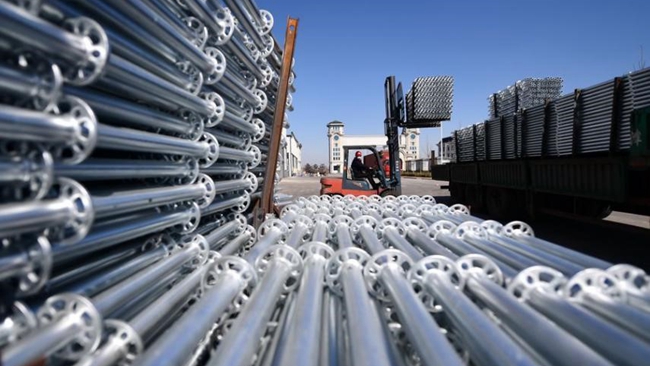News Center

Economic Watch: China pledges stronger macro policies to offset economic impact of COVID-19 Release date: 2020-03-31 Source:Xinhua

To lower lending costs and offset the economic shock of the novel coronavirus (COVID-19) outbreak, China's central bank on Monday pumped liquidity into the market through seven-day reverse repos while cutting its interest rate by 20 basis points.
The rate cut has echoed arrangements at the meeting of the Political Bureau of the Communist Party of China Central Committee Friday that prudent monetary policy should be pursued with more moderate flexibility, said Wen Bin, a chief researcher with China Minsheng Bank.
A package of macro policies and measures will be introduced, the meeting noted, and China will appropriately raise the fiscal deficit ratio, issue special treasury bonds, increase the scale of special bonds for local governments, and guide the interest rate to decline in the loan market.
"China is establishing a macro adjustment system with fiscal and monetary policies being the main methods, harnessing synergies of the policies related to employment, industries, investment, consumption and regional development," Bai Jingming, vice president of the Chinese Academy of Fiscal Sciences, told Economic Daily.
Amid the country's efforts to contain the COVID-19 outbreak, expenditure on health saw double-digit growth, up 22.7 percent year on year in the first two months, and spending on social security and employment also logged a 2.5-percent expansion from the same period last year.
"In times of difficulty, it is all the more important to increase the countercyclical adjustment of fiscal policies," said Yang Zhiyong, a researcher with the Chinese Academy of Social Sciences, noting that raising the fiscal deficit ratio will replenish "supplies" for fiscal expenditure.
At least 400 billion yuan (about $56.78 billion) of financial resources will be unleashed if the government raises the fiscal deficit ratio to 3.2 percent, Yang estimated.
In the first two months, China's central government spent a total of 426.9 billion yuan, up 4.7 percent from the same period last year, while local government spending edged down 3.9 percent year on year to 2.8 trillion yuan.
Issuing special treasury bonds can increase the transfer payments to local governments, helping the enterprises and areas hard hit by the virus outbreak pull through and recovering the local economy, Yang said.
Having been issued twice in history, special treasury bonds refer to those ones which are specifically made for certain policies and projects and are not calculated in the fiscal deficit.
Issuing special treasury bonds is in line with the goals of current policies, and will help avoid excessive growth of local government debt, said Zhang Jiqiang, an analyst with Huatai Securities.
As of March 20, China's local government bond issuance reached 1.4 trillion yuan, accounting for 76 percent of the allocated quotas, while about 1.02 trillion yuan of that is local government special bonds, according to the Ministry of Finance.
"Special treasury bonds and local government special bonds are complimentary in positioning. Utilizing these two policy tools at the same time can deliver more effective performance," said Zheng Chunrong with the Shanghai University of Finance and Economics.
As critical measures to cope with the pandemic and restore economic growth, a series of monetary policies have been rolled out by the government since the COVID-19 outbreak to step up countercyclical adjustment.
Starting on March 16, the People's Bank of China (PBOC) implemented targeted reserve requirement ratio cuts for eligible banks, the second such cuts this year, that would release another 550 billion yuan of liquidity into the market.
Moreover, the PBOC has expanded a special re-lending quota by 500 billion yuan from the original 300 billion yuan.
"China has rich monetary policy toolkits with ample space at its disposal," said Wen, adding that China still have room to lower its deposit and lending rate while many countries have trimmed their benchmark interest rate to zero or even negative.
Many countries have unveiled fiscal and monetary policies to mitigate the impact of the virus, however a single country can only work out policies for its own good while all countries joining hands can create public policies benefiting the whole world, said Li Yong from the China Association of International Trade.
"As the world economy is being put in a haze by the pandemic, China has voiced its stance on making efforts to stabilize the world economy," said Zhang Yansheng, chief researcher of the China Center for International Economic Exchanges. "Strengthening cooperation between countries and moving forward together are what should be done for the next step."